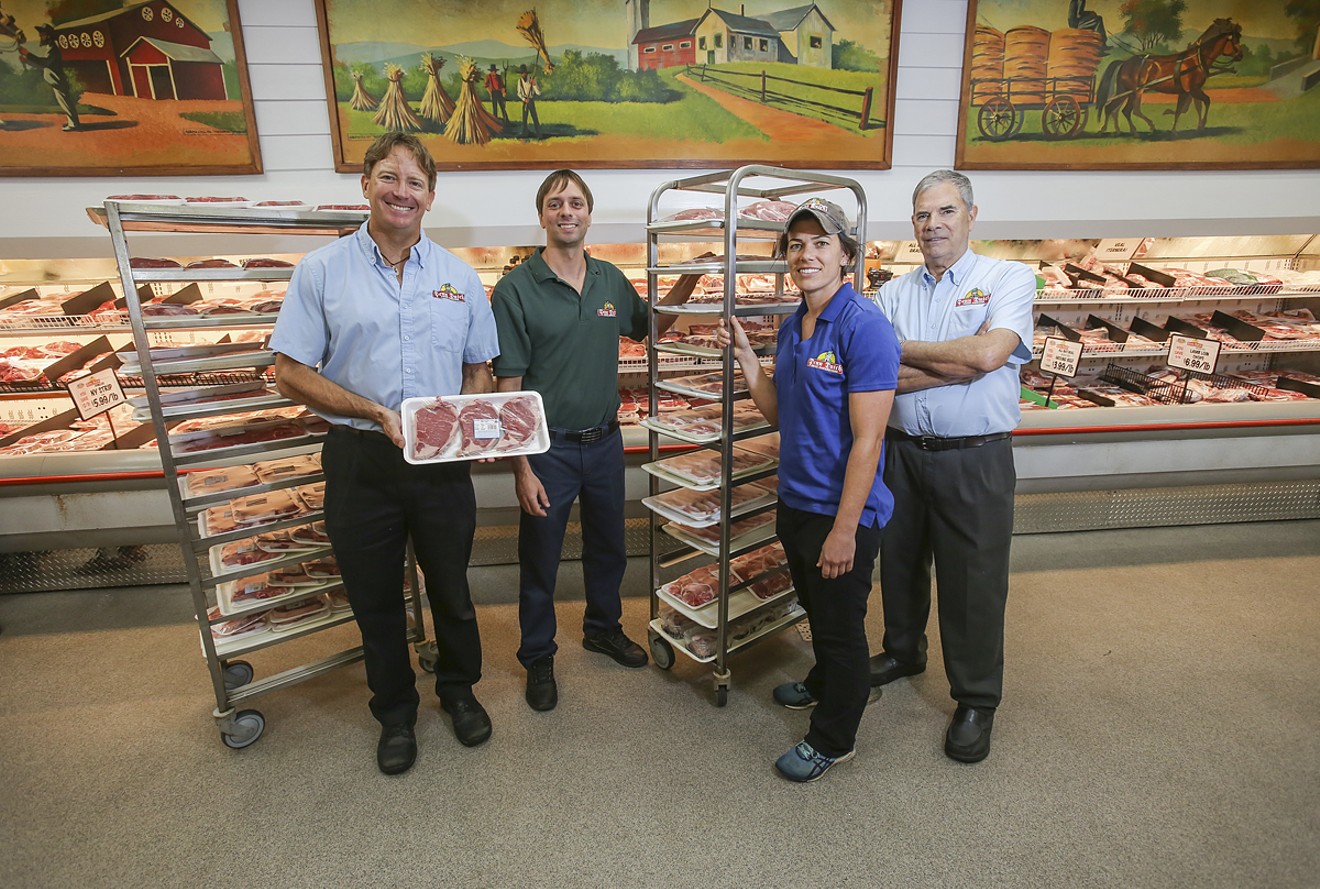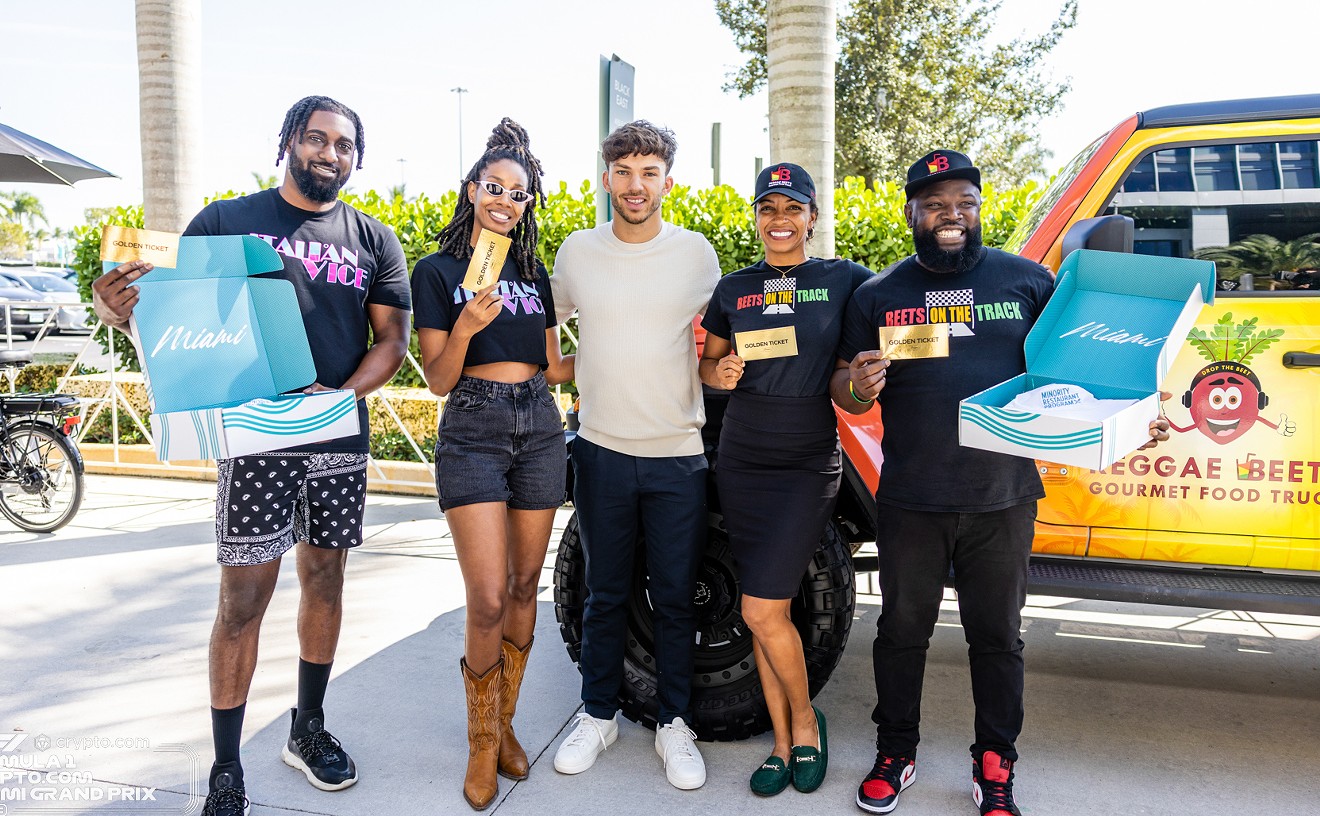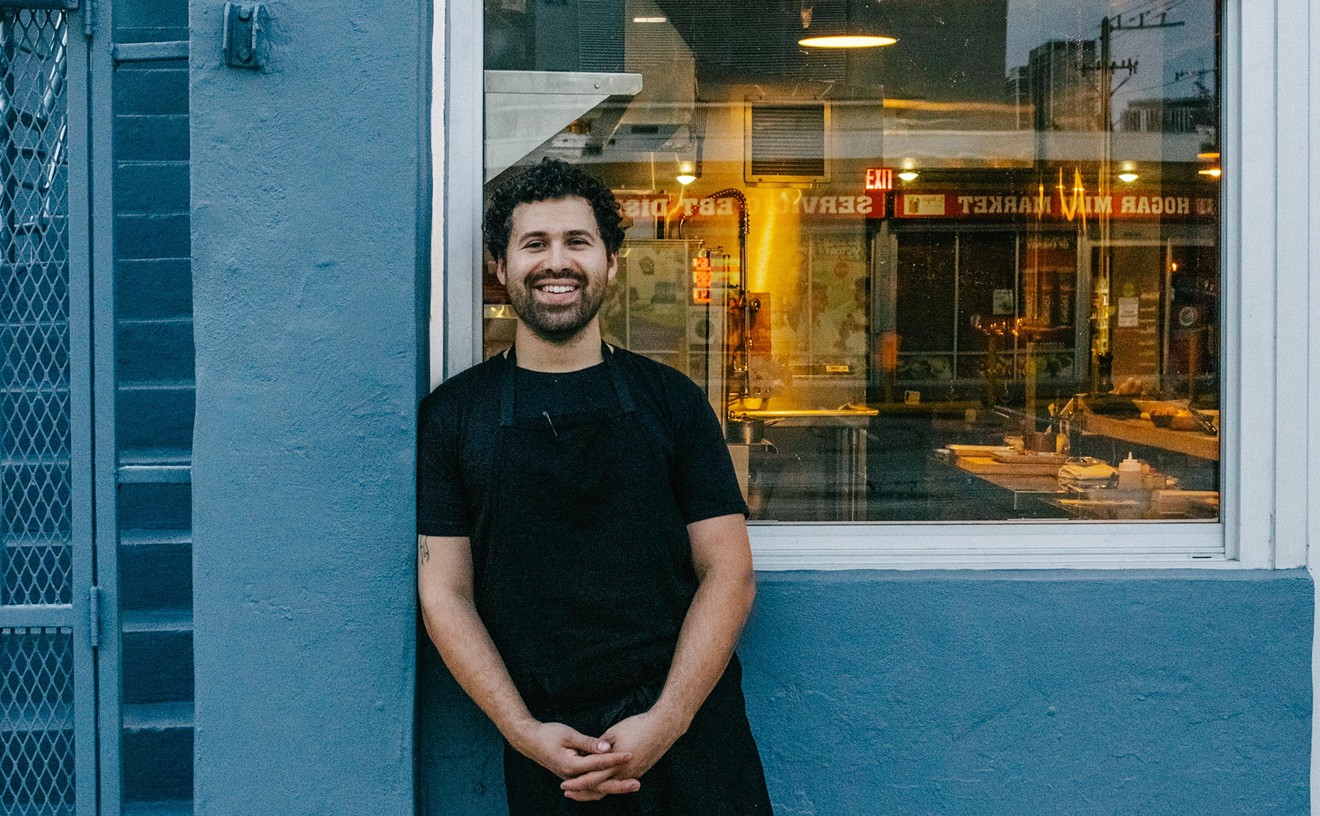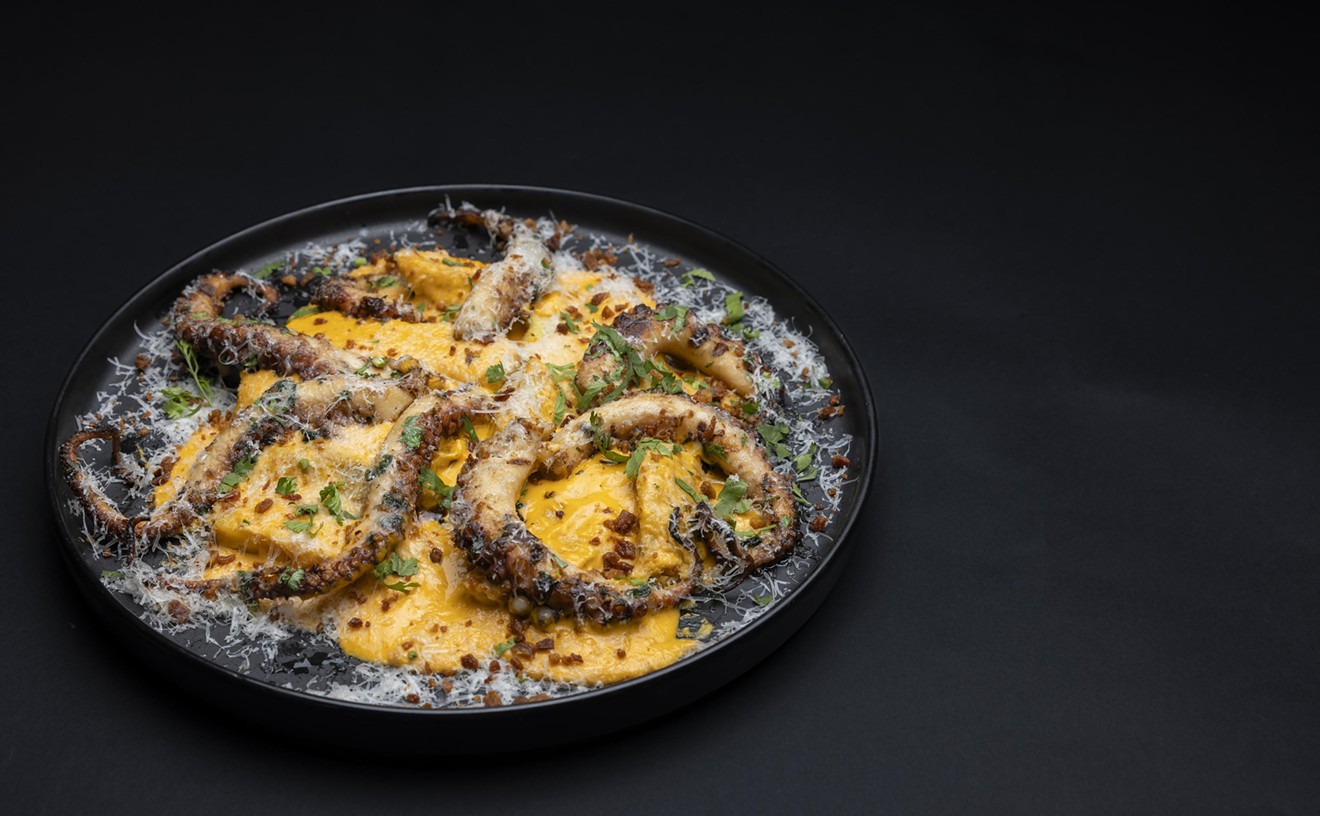Jonel Vajanc has spent much of the past three decades tucked away inside the maze full of stainless-steel equipment and warehouse-size refrigerators and freezers behind Penn Dutch Food Center (3950 N. 28th Ter., Hollywood; 954-921-7144; penn-dutch.com). Some days he ensures that thousands of hot dogs, stuffed into sheep casings that yield a crackly shell once grilled, are produced, packed, and ready in time for a big weekend. Other times, he coordinates a staff of more than a dozen as they grind and case sweet and spicy Italian sausage, chorizo, or paprika-laden Hungarian sausages.
Yet on this weekday morning, the 63-year-old Vajanc and another worker preside over a huge vat of liver pudding, an Old-World classic prepared deep inside the labyrinthine recesses that produce some of South Florida's best — and best-priced — meat.
"We make and carry things you can't find anywhere," Vajanc says as he helps wheel a steaming vat of spiced and ground pork tongues, snouts, and livers from one room into another, where the mixture will be stuffed into white, two-inch-wide white casings. Vajanc, who moved from the former Yugoslavia to America in the early 1980s and then to South Florida in 1985, wears a beige plastic apron that reaches to the floor and covers bright-yellow rubber boots. His face, however — smooth with rimless glasses and a close-cropped white goatee — looks more like that of a surgeon than a butcher.

Vajanc and his co-workers, most of whom Penn Dutch's legions of regulars never see, are what set the place apart. As grocery stores become more homogenized and less local — consider Amazon's $13.7 billion purchase of Whole Foods — the family that owns Penn Dutch has opted to retain the old way of doing things. And it's working. They recently spent a half-million dollars revamping the Hollywood flagship while planning a third store, their first in more than 12 years, slated to open in Sunrise next year.
The family that owns Penn Dutch has opted to retain the old way of doing things.
tweet this
That success lies in the costly, complex, and never-ending work involved in wet-aging thousands of pounds of meat for weeks and then butchering it by hand while also making dozens of varieties of sausages and, incredibly, deli meats such as turkey, ham, and roast beef that for most people have always come out of a Boar's Head wrapper.
"We come here because we know how everything is done here," says Eddy Gutierrez, a 37-year-old construction worker who on a weekday is picking up cold cuts for his family before moving on to hillocks of short ribs and tri-trips for Saturday. "We grill every weekend, and here they have everything, every cut of beef, pork, lamb, even parts most people don't eat."
The Salsburg family never intended for Penn Dutch to become a carnal capital. For decades before moving to Florida, patriarch and matriarch Edwin and Sophy Salsburg owned a butchering and meat-processing facility on the outskirts of Lancaster, Pennsylvania, where they broke down whole pigs and cows into manageable portions. When they sold the business and moved to Florida in the early '70s, they sought to use that knowledge to generate a small income and persuaded one of their sons, Paul, now 73, to follow after a tour in Vietnam.

"I didn't have anything going on at that time, plus Florida looked a whole lot better than Pennsylvania," says Paul, who wears a crisp blue button-up shirt bearing the store's jolly Dutchman logo on a breast pocket. "And there was nothing like what we wanted to do down here."
He and his father cobbled together a half-million dollars to buy a defunct tomato sauce factory within eyeshot of the newly built I-95. They planned to follow the same plan they had back North: Visit farmers and ranchers throughout the West and Midwest, buy product directly, process it, and then pass it all on to customers. He persuaded his brother Bill, now 81, and Rick, now 69, to move south for what eventually became a golden opportunity. (Years later, they would paint the building its unmistakable yellow.)
The trio turned out to be perfectly suited for the job. Bill was the meat cutter and had no problem breaking down the half cows the place received in large freezer trucks and then shuttling them through the building on hooks attached to the bright-yellow I-beams that still line the ceilings. Paul was the processor responsible for the frankfurters, sausages, deli meats, and all other goodies that fill the store's brightly lit cases garnished with kale leaves. Rick, with a degree in electrical engineering, ensured every facet of the place ran well. That's possibly the most important job, considering the millions of dollars' worth of meat and produce at risk in the event of a power outage. Generators are checked religiously, and despite decades of hurricanes, they've yet to lose a cooler full of merchandise.

Over the years, they grew. In the '80s, they doubled the size of the building to its current form: A 35,000-square-foot concrete maze that buzzes with activity almost 16 hours a day. Floor workers hustle to and fro bringing out fruits and vegetables such as tomatillos (99 cents a pound), shallots ($2.99 a pound), and celery root ($3.29 a pound) as production staffers toss whole chickens in a mustard marinade or push racks of recently smoked hams and turkey legs out of a towering trio of smokers and into a refrigerator. Today the place is run by Greg Salsburg, Bill's 50-year-old son. He stands taller than six feet, has broad shoulders, and wears a shark's tooth around his neck. He's a passionate fisherman who wakes each day around 5 a.m. for a long bike ride before showing up at the Hollywood store shortly before 9 a.m.
Though his father and uncles still remain active at the store, it's Greg and the younger generation of the Salsburg family who are responsible for shepherding Penn Dutch into the future.
"I grew up as a kid working in this store every Saturday," Greg says. "I was going to go to law school, but once I got out into the world and realized what a great thing it was that my father and grandfather had built, I realized I couldn't walk away from it."
Keeping it going isn't easy.

"We've continued buying directly from producers to keep our prices down, even as people have tried to steer us toward wholesalers," he explains. Though the majority of the meat comes from agribusinesses such as Cargill, prices are still low because of Penn Dutch's in-house processing. Packages of all-beef hot dogs go for about $4, and huge cuts of meat containing more than a half-dozen steaks can be found for less than $20.
Penn Dutch's small size compared to other grocery chains allows the owners to buy all kinds of produce at discounted prices and pass those savings on to customers.
"Say a distributor has a couple hundred cases of broccoli that Publix doesn't want," Salsburg says. "He'll call me, and I can get them for 40 cents on the dollar."
The vast selection of meats and well-priced produce is what has kept Carolyn Caffelette, an 85-year-old from Pembroke Pines, coming back for 20 years.
"The meats here are always better. They always have every neck bone and every piece of sausage I need for a Sunday sauce," the Italian grandmother says. "No matter what you're looking for, they have it."
That's why the parking lot is a traffic jam on weekends. Inside, aisles are bumper-to-bumper with carts.
The real reason they're there is hidden behind the big swinging doors that lead into the maze where Penn Dutch miracles happen. It's where a rich, creamy, meaty emulsion is drawn into a long log and wrapped in gold foil to make liverwurst. It's where workers pump dozens of hogs' legs full of brine to ensure they remain juicy during and after smoking.
So while the grocery industry evolves to sameness, Penn Dutch believes there will always be enough people around who like to see products up-close and in person.
"For items like seafood or produce, I don't know how much I would trust ordering it online," Greg says. "I want to see it before I buy it."












